Petsitting in Barcelona
I’m still here in the capital of Catalonia, getting ready for the next leg of our journey, which I’ll tell you about next week. While Nuvia has been working with educators I’ve been reading, writing, and going for long walks around Sarria with Kona, our host’s lovable mutt who started her life in a beach town in Chile.
In the meantime, I’ve had a great time connecting with old and new friends in Barcelona. I’ve had the pleasure of dining with
and her partner Alfie who happens to be an excellent chef. I had an old school Catalan lunch with Desert Notes author Ben Ehrenreich whose dog I looked after in LA what seems like a lifetime ago. I had bubble tea with Josh Denslow who took me to an incredible bookstore in Raval and has a fascinating short story collection coming out in May. And I had coffee in Gràcia with Megan McDowell whose translations have exposed me and countless others to the weird and wonderful world of Latin American literature.I finished reading Colm Tóibin’s Homage to Barcelona, which I highly recommend. It’s full of wonderful stories about Gaudi, Picasso, Miro, Casals, Dalí and many others. I didn’t realize Dalí, always an eccentric, supported Franco and cheered the deaths of political prisoners the dictator executed just months before he died. I’ve always wanted to make the pilgrimage to Figueres but not anymore. Fuck that guy. Never go full fascist.
Another story: Did you know that Joan Miro and Ernest Hemingway were sparring partners at a boxing gymnasium in Paris? I love that when Miro had a breakthrough in his art and his contemporaries in the art world didn’t get it, it was writers like Hemingway who recognized the importance of what he was doing and pulled together money they didn’t have to purchase his work.
I have since moved on to George Orwell’s Homage to Catalonia, as one does, since the two books are in conversation with each other, but I’ll be coming back to Tóibin soon.
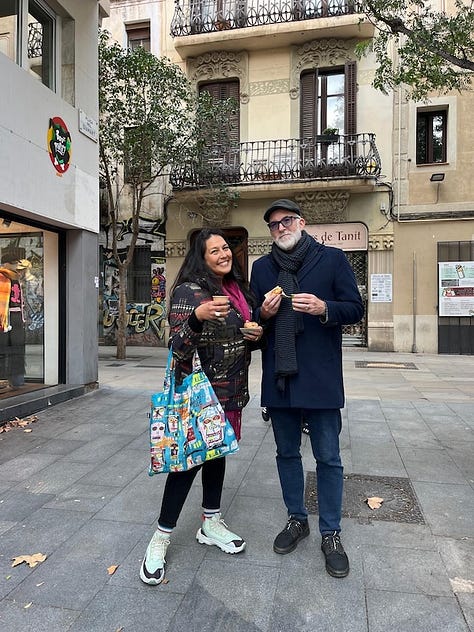
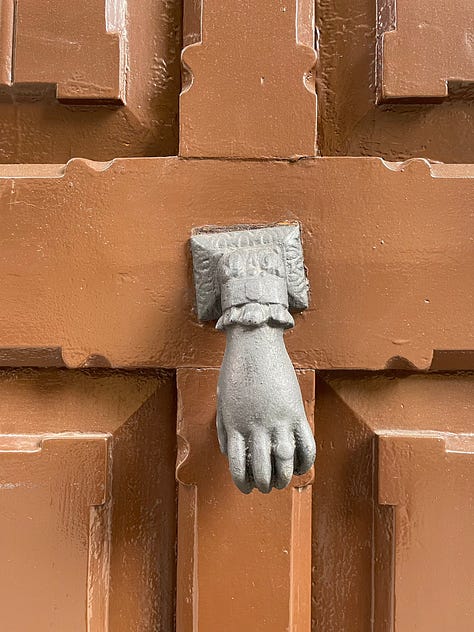

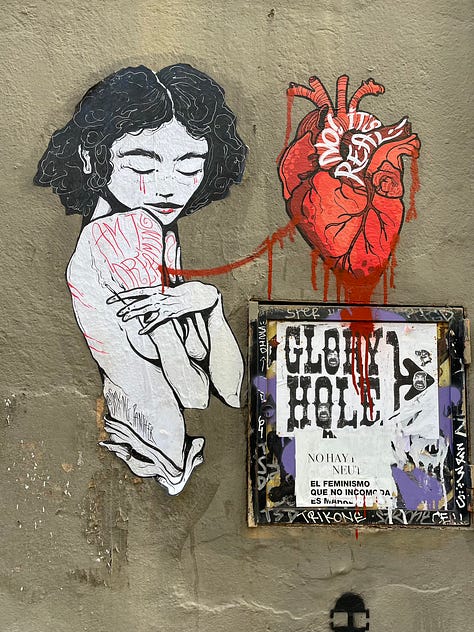
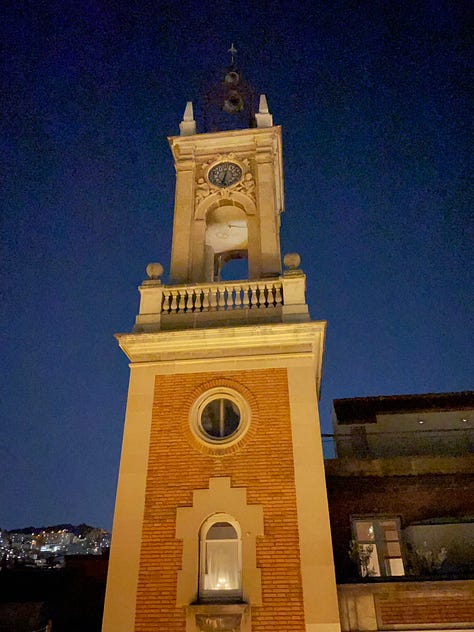
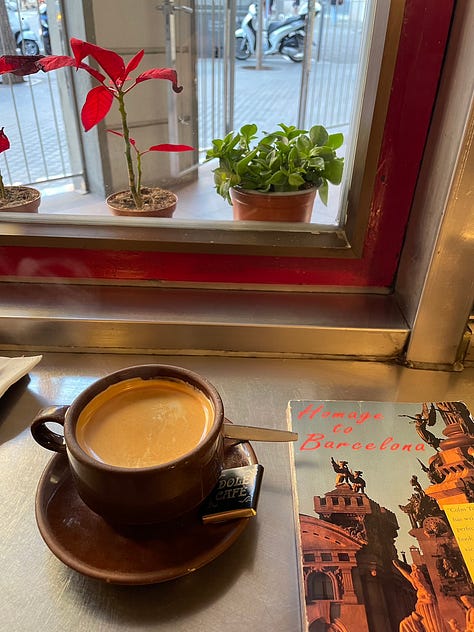
An interview with Sarah Tomlinson
Today I want to talk about Sarah Tomlinson’s novel The Last Days of the Midnight Ramblers, which just came out in paperback yesterday and she’s celebrating at Stories Books and Cafe on February 25.
Sarah is a novelist, memoirist, ghost writer, and former rock journalist so we have a great deal in common. Before we get into her latest book, some real talk: the house Sarah was living in burned down in the Eaton Fire and she lost just about everything she owns. A friend created a gift registry to help Sarah get back on her feet and I’m sharing it here so we can all do our part. (You will need to enter Sarah’s email, which is sarahtrex@gmail.com.)
The novel tells the story of Mari, an ambitious ghost writer who is coming off a bruising experience with a difficult client when she gets the opportunity that could catapult her to bestseller status, which is what every ghostwriter aspires for, or wreck her career. Mari doesn’t just want this job, she needs it, which drivers her to make some reckless decisions as she dives deep into the lore of one of the biggest rock and roll act since the Beatles.
Sometimes a book comes along at the perfect time and helps you sort some things out that have been taken up way too much of your brain space. The Last Days of the Midnight Ramblers did that for me.
Jim Ruland: First of all, how are you? You’re launching the paperback of your novel at a very challenging time.
Sarah Tomlinson: As with any kind of grief, I feel different every day. Overall, I’m very grateful to be safe and supported by an extremely caring group of family and friends, as well as the greater LA writing community. I have been deeply humbled by the generosity of so many people, including total strangers. It has been painful to lose my archives—all of my journalism clips and journals, as well as my hard drives full of earlier work. I was one of those pretentious kids who always wanted to be a writer and dreamed of someday selling my papers to a university! But I also know, as a writer, I am fortunate that my work still exists in the world, as compared to so many visual artists in Altadena, who literally lost their life’s work. It’s hard to even contemplate. I am happy to have a new novel due to my publisher, so I’m trying to get back to work as well. I am thankful to have my computer and handwritten notes for that manuscript, and it feels good to write as a way to remember what hasn’t been lost.
As you know, I’m no stranger to the dark art of creative collaboration. Reading your book was equal parts therapeutic and anxiety-inducing. My thoughts were never far from my own projects and I’d think, “I do that” or “I don’t do that” or “I’d never do that!” What was the process of putting your protagonist, Mari, together?
Mari was definitely based on me, but at the time I began writing my novel in earnest, I had done a full decade of ghostwriting, and I knew I needed to make her younger and less experienced, so she’d have more room to stumble and grow. The opening scene at the Polo Lounge was drawn from a real 2011 meeting, which landed me the ghostwriting project that would be my first NYT bestseller. Some of Mari’s mistakes were ones I made in real life. But to up the drama, I had her do some morally questionable things that I would never do in real life. The book fully came together when I decided Mari’s ghostwriting gig(s) would be set in the music industry, as that allowed me to also draw on my experience as a rock journalist and write about a world I’ve always loved. Also, because her character essentially becomes an amateur sleuth, I was interested in examining what skills a journalist/ghostwriter possess that could help her to solve a mystery.
You really capture the whirlwind of what it means to write in the voice of another: the perils of sharing your work with the client for the first time and the safety of hiding behind the mask of another. What is it like stepping into the spotlight, both the imaginary glare of your fictive ghostwriter, and the real one as you promote the novel?
Like many artists, I can feel a bit uncomfortable with the promotional part of the job, but I am lucky to be fairly extroverted for a writer. And I had dreamed of being a novelist since I was sixteen, so in some ways I had been preparing to launch my debut novel for my entire adult life. I’ve always enjoyed attending readings by other authors and drawn inspiration from interviews about their process and craft, so I just tried to think of adding to that larger conversation about writing. Plus, I’ve had practice over the years, taking part in many local literary series, like your fabulous Vermin on the Mount (RIP) Of course, my celebrity clients have a much splashier experience when they promote their books—I’m not too proud to say I dream of also having my book cover on the jumbotron in Times Square someday —but I knew my launch would be quieter. I was fortunate enough to receive a tremendous amount of support from my publisher, Flatiron, so I wanted to make my team proud by doing a good job of spreading the word about my novel.
Fiction writers are often told not to worry about the marketplace, to write the book only you can write. That doesn’t apply in the world of ghostwriting does it?
Yes and no. Obviously, celebrity books are all about the marketplace, because they are acquired and published with the knowledge that there is (at least theoretically) a fanbase eager to receive them. And yet, I think I’ve always tried to help my clients to write the book that only they could write, because that’s the goal inherent in trying to find each person’s authentic narrative voice, and to dig into the specificity of a story that can make it universal to as many readers as possible.
Mari lives a double life, parachuting into the luxurious life of her clients when her own situation is quite precarious. She doesn’t just aspire to write a bestseller she convinces herself she needs it which is always a dangerous place to be. How do you deal with the pressure of expectations?
Ha, well, I once ghostwrote a self-help book about the dangers of having unrealistic expectations in life, so I should be a master on this subject! The tricky part about ghostwriting, at least for mainstream celebrities, is that in order to be put up for higher profile books, and earn a better rate, you do eventually need to have a bestseller on your resume. That pressure Mari puts on herself isn’t just in her mind, as I experienced myself. However, it’s nearly impossible to predict what books will actually be bestsellers—I’ve worked on many titles that everyone on the team believed were surefire hits, only to have them miss the list, sometimes by a thin margin, sometimes not. So, my strategy as a young ghostwriter was to pen as many titles as possible. That was also a great way to work with many talented editors and hone my skills as a ghost.
As a ghostwriter, what’s the question you get asked the most?
ST: People always want to me to reveal my clients (which, of course, I don’t—expect for those celebrities I’ve co-written with, like Russ Tamblyn, whose excellent memoir, Dancing on the Edge, came out a few months after my novel). They also often get very indignant on my behalf that I don’t get credit for the books I’ve written. I try to explain that it doesn’t bother me (or else I would have lost my mind long ago). I also often use the analogy that a ghostwriter is like a music producer or engineer; the celebrity is the musician who comes into the studio with amazing songs, but they need some technical help to get them down. I guess that’s another way of saying, it’s definitely a type of service job, and I enjoy that aspect of the work, which I tried to make clear in the way Mari expresses the love she feels for her clients.
I enjoy that part of it as well: being of service to someone telling their story. I recently read Pamela des Barres I'm with the Band and I can see its influence on Mari's first client Anke. The Midnight Ramblers themselves feel like a mash-up of The Rolling Stones and the Who. Am I close?
Excellent question! I've read I'm with the Band and have a great deal of respect for Pamela as a writer and cultural figure, so I'm sure there's a bit of her in Anke. But there was also an innocence and sheltered quality to Pamela and her fellow American groupies, whereas I was always fascinated by the way the Rolling Stones' lovers— Anita Pallenberg, Marianne Faithfull (RIP), and Uschi Obermaier—have been credited with broadening their horizons and influencing their style. I adored Marianne's incredible memoir, Faithfull, which was so funny and humble and wise. I also read the great posthumous biography of Anita, She's a Rainbow. But perhaps my biggest influence for Anke was Uschi, whose unbelievable life was captured in the biopic Eight Miles High. So, yes, the Ramblers were very loosely based on The Rolling Stones, largely because I wanted the mystery in my book to be drawn from a real rock 'n' roll mystery, and I've always been intrigued by the lingering rumors that Brian Jones was murdered, even though I don't believe they're true. But once I started writing the band members, they became their own characters with their own unique backstories and personalities.
Order The Last Days of Midnight Ramblers from Bookshop.org now!
Little Mysteries at Skylight Books
Next week I’m going to be in LA on Tuesday February 11 to celebrate the launch of Sara Gran’s new book Little Mysteries. She’ll been conversation with Tod Goldberg at Skylight Books and I’ll be there. Also, next week I’ll have an interview with Sara here at Message from the Underworld.
If you liked this newsletter you might also like my latest novel Make It Stop, or the paperback edition of Corporate Rock Sucks: The Rise & Fall of SST Records, or my book with Bad Religion, or my book with Keith Morris. I have more books and zines for sale here. And if you’ve read all of those, consider checking out my latest collaboration The Witch’s Door and the anthology Eight Very Bad Nights.
Message from the Underworld comes out every Wednesday and is always available for free, but paid subscribers also get my deepest gratitude and Orca Alert! on most Sundays. It’s a weekly round-up of links about art, culture, crime, and killer whales.




Thanks for sharing this!
De nada -- thanks for reading!